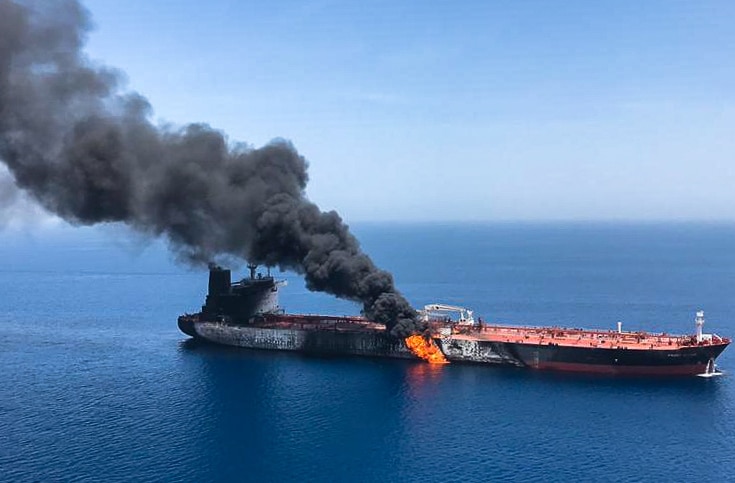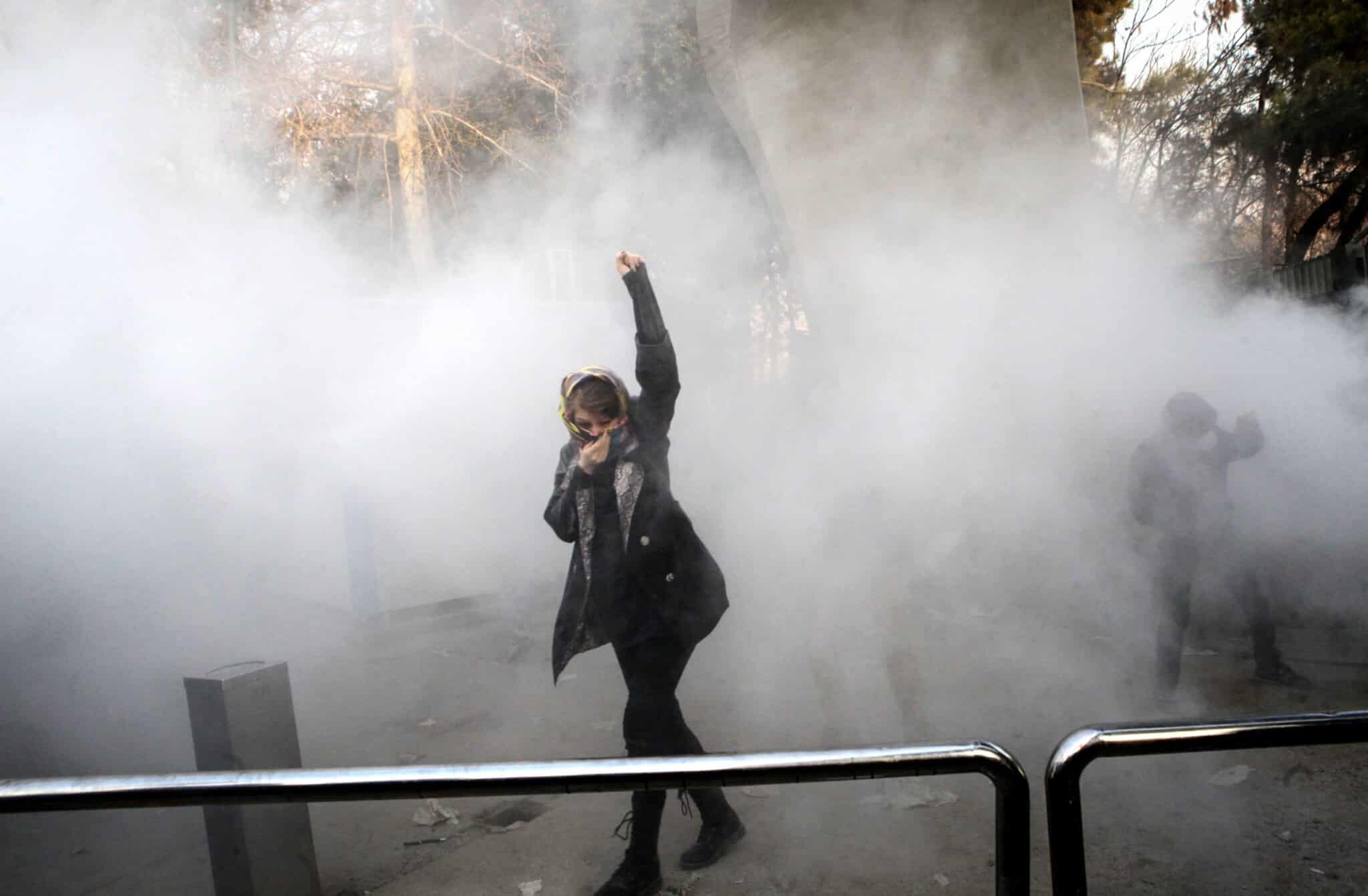January 14, 2021 | From Trump to Biden Monograph
Iran
January 14, 2021 | From Trump to Biden Monograph
Iran
Current Policy
Over the last two years, the Trump administration’s “maximum pressure” campaign – an effort modeled on President Ronald Reagan’s “victory” strategy to defeat the Soviet Union – continued to drain financial resources from the Islamic Revolutionary Guard Corps (IRGC) and to squeeze Iran’s leaders to make a choice between regime survival and negotiations.
In 2019, President Trump established a U.S. policy to drive Iranian oil revenue to near-zero,1 imposed sanctions on Iran’s metal industries,2 and ordered the IRGC designated as a foreign terrorist organization.3 The Treasury Department designated the Central Bank of Iran and Iran’s National Development Fund for financing terrorism,4 while Treasury’s Financial Crimes Enforcement Network issued a final rule declaring Iran’s financial sector a primary jurisdiction of money laundering concern.5
In 2020, Trump imposed sanctions on Iran’s construction, manufacturing, mining, and textile sectors, while authorizing the Treasury Secretary to impose sanctions on any other sector of Iran’s economy.6 This authority was later used to blacklist the entire Iranian financial sector, including 18 banks that had not yet been subject to U.S. sanctions.7
The administration also employed sanctions as a tool of political warfare, not just economic pressure. The president imposed sanctions on the supreme leader’s business empire, highlighting corruption at the very top of the Iranian regime.8 The administration also designated Foreign Minister Javad Zarif and noted the foreign ministry’s record of coordination with the IRGC.9 After the administration made a compelling case, the 39-member Financial Action Task Force called on global financial institutions to reimpose countermeasures on Iran’s financial sector due to the regime’s continued money laundering and terror finance activities – a significant blow to Iran’s efforts to legitimize itself within international fora.10
Separately, the Trump administration leveraged Israel’s exfiltration of a secret Iranian nuclear archive to emphasize the regime’s deliberate violation of the 2015 nuclear deal, formally known as the Joint Comprehensive Plan of Action (JCPOA). For example, the Treasury Department imposed sanctions on Iranian nuclear weapons scientists still employed at a secretive organization run by the founder of Iran’s past nuclear weapons program. At the International Atomic Energy Agency (IAEA), U.S. diplomatic pressure produced a resolution calling on Iran to answer questions about its possible concealment of undeclared nuclear material and activities. Treasury also designated the Atomic Energy Organization of Iran for its uranium enrichment activities,11 and the State Department ended all sanctions waivers for JCPOA nuclear cooperation projects.12
Trump’s policy with regard to military deterrence evolved in the last two years of his administration. For most of 2019, the United States did not respond militarily to an Iranian shoot-down of an American drone, mine attacks on ships in the Persian Gulf, a cruise missile attack against Saudi Arabia, and increasing rocket fire targeting U.S. interests in Iraq. That changed in late December when, in the midst of an uptick in Iranian-sponsored plots against U.S. interests, the United States bombed facilities belonging to Iran’s most powerful militia proxy in Iraq. Days later, Trump ordered a strike killing IRGC Quds Force Commander Qassem Soleimani and Iraqi militia leader Abu Mahdi al-Muhandis.13

A picture obtained by Agence France-Presse from Iranian News Agency on June 13, 2019, reportedly shows fire and smoke billowing from the Norwegian-owned tanker Front Altair, said to have been attacked in the Gulf of Oman. (Photo by ISNA/AFP via Getty Images)
Finally, the administration’s decision to trigger the snapback mechanism of United Nations Security Council Resolution 2231 led to a dispute at the UN Security Council. The other four permanent members do not acknowledge the snapback of UN sanctions on Iran and therefore insist that the UN arms embargo on Iran expired in October 2020. U.S. policy states a snapback did occur, so the embargo remains in force. Accordingly, the president threatened sanctions if Russia or China attempt to transfer conventional arms to Iran.
Assessment
The maximum pressure campaign succeeded in limiting the resources available for the regime’s malign activities. Iran was forced to cut its defense budget by more than 24 percent, while terrorist proxies such as Hezbollah continue to report financial pressure due to lost subsidies from Tehran.14 Recent data from the International Monetary Fund estimates Iran has less than $9 billion in accessible foreign exchange reserves and is heading for a loss of 5 percent of GDP for 2020.15 The regime has suffered a catastrophic loss of oil revenue – with one estimate in March 2020 of 144,000 barrels per day in oil exports – while total exports, including non-oil goods and services, were expected to decline nearly 60 percent in 2020 compared to 2017.16 The rial-dollar exchange rate fell to an all-time low of over 250,000 to 1 in late 2020, down from 38,400 when Trump took office.17
With an economy teetering on the brink of collapse, protests against the regime are happening more frequently. In late 2019, after the regime announced a cut in gasoline subsidies, nationwide protests erupted. Iran’s leaders responded by shutting down the internet for days and killing 1,500 people.

An Iranian woman raises her fist amid the smoke of tear gas during protests at the University of Tehran on December 30, 2017. The people of Iran have suffered under a corrupt, repressive regime for nearly 42 years. The new administration should tie human rights to any future negotiations. (Photo by STR/AFP via Getty Images)
American and Israeli strikes on Iran’s military infrastructure – including the killing of Iran’s top battlefield commander, Soleimani, and possibly Iran’s nuclear weapons architect, Mohsen Fakhrizadeh – further weakened the regime. The financial and psychological costs of apparent sabotage operations against Iran’s nuclear and missile programs also took their toll.
Despite these successes, it is impossible to describe the maximum pressure campaign as truly “maximum.” JCPOA-related sanctions were only re-imposed in late 2018. Entire sectors of the Iranian economy were left untouched by U.S. sanctions until January 2020, while the Iranian financial sector, including 18 banks, escaped sanctions until October 2020. The administration only recently began to use its naval capabilities to intercept illicit cargoes coming from Iran, which, if continued, could dramatically reduce the leakage in U.S. sanctions involving China, Venezuela, and Syria.
Meanwhile, American political warfare against Iran suffered from inherent contradictions between expressing support for the Iranian people while claiming to pursue the ultimate goal of a deal with their tormentors – a deal that would not address human rights. Additionally, U.S. signaling of troop drawdowns in Iraq, Afghanistan, and Syria stoked fears among allies that the strike on Soleimani was the exception that proved the rule with respect to Trump’s willingness to hold Tehran accountable for aggression and terrorism.
Tehran’s perception of American willingness to use force and of Washington’s backing for Israeli use of force is paramount in a maximum pressure campaign – both to deter attacks on U.S. interests and to deter Iran from developing nuclear weapons. This concern became ever more relevant as Iran continued its own counter-pressure campaign: accumulating more low-enriched uranium every day, including enrichment at the underground Fordow facility, testing advanced centrifuges, and producing (and selling) excess amounts of heavy water. Iran also reduced its nuclear breakout timeline from one year to a few months.
While U.S. policy moved in the right direction, it would have been more effective with a stronger focus on human rights, increased military deterrence operations, and sustained enforcement of truly “maximum” economic pressure.
Recommendations
- Avoid past mistakes of offering sanctions relief to Iran prior to the implementation of a comprehensive agreement that addresses the full range of Iran’s malign activities, including the irreversible dismantlement of key nuclear and missile capabilities.
- Demand Iran fully account for its past and present undeclared nuclear activities. If Tehran refuses, press for the IAEA Board of Governors to refer Iran to the UN Security Council for breaching the Nuclear Non-Proliferation Treaty.
- Enforce existing and impose new sanctions on entities connected to the IRGC and other terror-related activities.
- Enforce sector-based sanctions on Iran’s financial sector until Iran addresses international concerns related to money laundering and terror finance.
- Affirm that sanctions imposed pursuant to Executive Order 13224 on Iran’s central bank and key institutions, including in Iran’s energy sector, constitute terrorism sanctions, and that no sanctions relief that directly or indirectly benefits entities subject to terrorism sanctions will be provided to Iran until Iran ceases its terror-related activities.
- Expand efforts to block U.S.-designated Mahan Air’s flights to Europe and the Gulf. The Biden administration should use secondary sanctions to target Mahan’s ticketing agents and ground services operators as well as banks facilitating the airline’s payments for airport services.
- Maintain strict oversight and parameters for the Swiss-based humanitarian channel to enable the sale of food and medicine to Iran while preventing the regime from diverting humanitarian goods from the Iranian people.
- Continue efforts to interdict Iranian arms shipments to Iraq, Yemen, and Syria.
- Enforce existing and impose new sanctions on entities connected to Iran’s missile programs.
- Enforce existing sanctions to prevent the transfer of arms by Russia or China to Iran.
- Provide maximum support to Iranian aspirations for democracy. Lift the U.S. travel ban on Iranians, and make human rights one of the demands for the negotiation of a comprehensive agreement.
- Ensure the United States has a credible military option to reinforce its economic and financial pressure. This must include a military plan to prevent Iran from producing a nuclear bomb, and a credible U.S.-supported military strategy to counter Iranian influence in the region. The United States should provide allies such as Israel all the support necessary to resist Iranian aggression.
- Build on the Abraham Accords to continue the normalization between Israel and key Arab and Muslim countries, including Saudi Arabia, and strengthen these alliances against Iranian malign activities in the region.
If the Biden administration provides premature sanctions relief to Iran or refuses to affirm that energy, banking, and other key sanctions are tied to Iran’s terrorism- or missile-related activities or to the supreme leader or his office, Congress should:
- Schedule quarterly classified briefings by senior administration officials to review Iran policy.
- Request periodic testimony by the Financial Crimes Enforcement Network to assess the risks of money laundering and terror finance within Iran’s financial sector.
- Send letters to foreign financial institutions and companies, including those that hold assets belonging to the Central Bank of Iran, the National Iranian Oil Company, the National Iranian Tanker Company, and other entities designated under U.S. terrorism-, missile-, or supreme leader’s office-related authorities, to warn them of the risks of processing or engaging in any transactions.
- Build on bipartisan IRGC sanctions enacted by the Countering America’s Adversaries Through Sanctions Act by prohibiting the suspension or waiving of sanctions on Iran that would provide financial benefit to Iranian entities designated pursuant to terrorism authorities – unless and until the president certifies to Congress that Iran is no longer a state sponsor of terrorism.
- Consider legislation that would require the president to immediately re-impose any suspended or waived sanctions on Iran if Iran or one of its proxies conducts a missile attack against U.S. interests or any country with which the United States has a defense relationship.
- Introduce a resolution that opposes the Biden administration’s return to the JCPOA and the lifting of all sanctions without addressing the nuclear flaws of the JCPOA as well as Iran’s ballistic missile development, support for terrorism, human rights abuses, and other destabilizing and malign activities.
- Codify Executive Order 13949, which deters the transfer of arms to Iran.
- Consider legislation preventing the cancellation of the U-turn transaction prohibition involving any foreign financial institution transacting with any Iranian bank.
